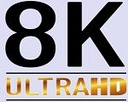 |
|
 |
|
VQMPC
VideoQ Multi-Purpose Charts
Suite of Versatile Dynamic Test Patterns
Instant picture & sound quality control tool
for the 8K / 4K / 2K, HDR / SDR environment
- Easy-to-use tool, instantly revealing your video device / system / workflow performance
- VQMPC tests can be used for visual-aural estimation and/or instrumental analysis
- Applications: Production, post-production, transcoding, distribution and consumer video
- BT.2100, BT.2020, BT.709 compliant tests
- Frame sizes: 8K UHD, 4K UHD, 2K HD
- Dynamic range formats: HDR-PQ, HDR-HLG, and SDR
- Variety of color spaces, frame rates and encoding formats
- Other sizes/formats (AR, LB/PB, 1080i, sub-HD, NTSC/PAL, etc.) are available on request
- 3 frame sizes: HD, 4K UHD, 8K UHD
- 3 dynamic range modes: HDR-PQ, HDR-HLG, SDR
- 2 color spaces: YUV NR BT.2020 (UHD and HDR), YUV NR BT.709 (HD SDR)
- VQMPC8K: 8K UHD High-end Production and Post-production
- VQMPC1: UHD and HD Production and Post-production
- VQMPC2: UHD and HD Contribution and Distribution
- VQMPC2HD: HD Transcoding and Distribution
VQMPC tests usage at Olympic Games proved that they are extremely useful for live sport coverage and other workflows requiring streaming in multiple formats or AV format conversions.
VQMPC tests provide for semi-automatic AV levels and AV sync measurement by VideoQ tools.
With a VQMPC test you can instantly check that the video circuit is active, workflow parameters are normal, and audio is in sync.
The leading OTT providers use VQMPC test to validate playback performance globally.
The layout, components and appearance of the SDR variants of VQMPC test pattern suite are similar to the HDR variants, which makes much easier the usage of the whole VQMPC suite in modern mixed formats environments.
VQMPC suite includes 9 combinations of:
For a given frame size each package includes 3 sub-sets of media files of 3 dynamic range formats: HDR-PQ, HDR-HLG and SDR.
For a given dynamic range format each sub-set includes 8 variants with different frame rates:
23.976, 24, 25, 29.97, 30, 50, 59.94 and 60 fps.
Each media file is produced either by a lossless, variable bitrate encoder
or by a relatively high-bitrate, but lossy, encoder (order options).









